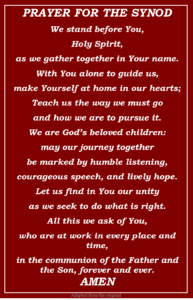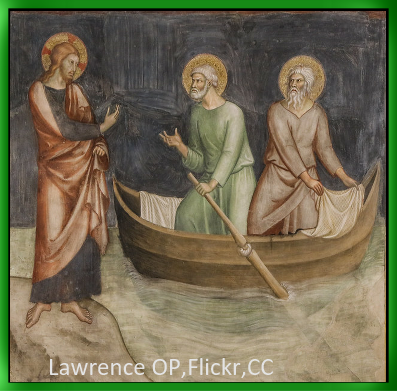22 January 2023
Isaiah 8:23 – 9:3 1 Corinthians 1:10-13,17 Matthew 4; 12-23
Theme: The people who lived in darkness have seen a great light
I have just finished reading Michelle Obama’s most recent book, The Light we Carry. It’s about sustaining hope in stressful and uncertain times and is a wonderful antidote to the pessimism and cynicism of our times. The theme of light looms large in the readings of today’s Mass. In our first reading, the great prophet Isaiah uses the image of light to announce a message of hope for an oppressed and downtrodden people: ‘The people that walked in darkness has seen a great light; on those who live in a land of deep shadow a light has shone’ (Is 9: 2). Our gospel reading from Matthew repeats the prophesy of Isaiah and identifies this ‘great light’ with Jesus of Nazareth. The responsorial psalm confidently proclaims our trust in the Lord, employing the image of light: ‘The Lord is my light and my help; whom shall I fear?’
Matthew tells us that Jesus, following the arrest of his cousin, John the Baptist, withdraws to Galilee, and settles in Capernaum, a fishing village on the northern shore of the Sea of Galilee. And it is there that Jesus launches his messianic mission. Like John the Baptist, he begins, not with a lengthy manifesto but with a simple exhortation: ‘Repent, for the kingdom of heaven is near’ (Mt 4:13). Matthew’s reference to ‘heaven’ can be misleading. For many Christians heaven is a ‘place’ where we hope to go after death, if we live good lives here on earth. This is the image of heaven Maria Shriver presents in her book, What’s Heaven, written for children: ‘It’s a beautiful place where you can sit on soft clouds and talk to other people who are there… When your life is finished here on earth, God send angels down to take you up to Heaven to be with him.’ A sweet image, certainly, but totally at odds with what Matthew means by ‘the Kingdom of Heaven’.
Belinda Carlile’s 1987 hit song ‘Heaven is a place on earth’ is much closer to the biblical idea of heaven than Maria Shriver’s picture of elysian bliss. Matthew’s ‘kingdom of heaven’ is identical with the more familiar term, ‘kingdom of God’, which was the central theme of Jesus mission. It refers, not to a place beyond the grave, but to God’s sovereign rule in our lives here and now. By his life and ministry, his words and actions, Jesus showed that this sovereign rule of God would mean nothing less than a complete transformation of our lives on earth. It would be ‘good news’, especially for the poor and exploited, the downtrodden and marginalised. It would mean the end of their misery and the creation of a society where justice, truth, peace and love would triumph over injustice, lies, hatred and violence. And it would be very good news, too, for the abused and exploited planet that is our common home.
Entering God’s kingdom and experiencing the power of God’s loving rule in our lives is not automatic. It requires a change of heart (metanoia) as Jesus’ exhortation makes clear. Jesus called his contemporaries to repent, and he asking for the same response from us today. However, we often fail to appreciate the full significance of this call. It implies much more that being sorry for the wrong actions we have done in the past. It means making a radical break with our past and taking our lives in a new direction. It means looking at life in a completely new way, putting on the mind and heart of Jesus, and allowing the Spirit of God to direct us. It is only when we begin to make this radical change that we are free to enter God’s Kingdom, and become sharers in the mission of Jesus.
 After his proclamation of the Kingdom, Jesus calls four fishermen (Simon and his brother, Andrew, James, son of Zebedee, and his brother John) to follow him and to share in his mission – ‘I will make you fishers of people’ (Mt 4:19). For them, this call will mean a complete change in their way of life, a decisive break with their familiar past and a readiness to risk an uncertain future. Matthew tells us that ‘Immediately they left their nets and followed him‘ (Mt 4:20). They put their total trust in Jesus, leaving behind their only means of livelihood, not knowing where it would all lead. Eventually, they would become not just disciples of Jesus but his apostles, sent to bring his light to others.
After his proclamation of the Kingdom, Jesus calls four fishermen (Simon and his brother, Andrew, James, son of Zebedee, and his brother John) to follow him and to share in his mission – ‘I will make you fishers of people’ (Mt 4:19). For them, this call will mean a complete change in their way of life, a decisive break with their familiar past and a readiness to risk an uncertain future. Matthew tells us that ‘Immediately they left their nets and followed him‘ (Mt 4:20). They put their total trust in Jesus, leaving behind their only means of livelihood, not knowing where it would all lead. Eventually, they would become not just disciples of Jesus but his apostles, sent to bring his light to others.
We, too, are called to be, not just disciples, but also apostles of Jesus, his light-bearers to a broken world, still mired in deep shadows. And, as St Paul reminds us in today’s Second Reading, it is Christ’s light we carry, not our own.
I will end with a short story about the great English Art Critic and writer, John Ruskin. One day, he was sitting with a friend in the dusk of an evening and watching a lamplighter, with a torch in hand, lighting the street lights on a distant hill. Eventually the lamplighter’s form was no longer distinguishable in the distance. ‘There’, said Ruskin, to his friend, ‘that is what I mean by a real Christian. You can trace his course by the light he leaves behind’. Let us pray that our course will be marked by the light we leave behind.
Michael McCabe SMA, Cork
To listen to an alternative Homily from Fr Tom Casey of the SMA Media Centre, Ndola, Zambia please click on the play button below.
|
|

